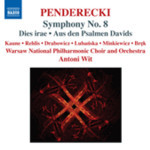
Penderecki: Symphony No 8
 $25.00
Out of Stock
$25.00
Out of Stock6+ weeks add to cart
KRZYSZTOF PENDERECKI
Penderecki: Symphony No 8
Michaela Kaune (sop) Agnieszka Rehlis (mezzo) Wojtek Drabowicz (bar) / Warsaw National Philharmonic Choir & Orchetsra / Antoni Wit, conductor
[ Naxos / CD ]
Release Date: Thursday 20 November 2008
This item is currently out of stock. It may take 6 or more weeks to obtain from when you place your order as this is a specialist product.
"…The recording quality on this disc is first class…Tenor Minkiewicz easily negotiates his tricky lines in the Dies irae, and hits the right level of hysteria. All the soloists are excellent, and the Warsaw National Philharmonic under Wit provides solid support." (Fanfare)
"…The recording quality on this disc is first class…Tenor Minkiewicz easily negotiates his tricky lines in the Dies irae, and hits the right level of hysteria. All the soloists are excellent, and the Warsaw National Philharmonic under Wit provides solid support.
This CD is a must if you are collecting the series; the Eighth is more interesting and certainly more varied than the instrumental symphonies (with the exception of the First). The combination of early and late Penderecki is also intriguing-for their surprising points of similarity as much as for their contrast. Texts and translations are not provided, but are available on the Naxos Web site."
--Review by Phillip Scott, Fanfare, July/August 2008
"This symphony is a setting of 19th and early 20th century German poems by Goethe, Rilke, and others, titled Songs of Transience. The settings are beautifully done, some of them quite haunting, which is not a surprise considering the subject matter. What is surprising is that most of this work would not have been out of place in the late 19thor early 20th century. Compare it to the hair-raising Dies irae from 1958, also on this disc, from Penderecki's avant-garde phase, and you will see how long a journey this composer has traveled."
--Review by Robert R. Reilly, InsideCatholic.com, July 29, 2008
"Krzysztof Penderecki has written his second choral symphony in a row and this time it's a secular one (with brief religiosity). He bases his text on several different poets: the nature-worshiping Joseph von Eichendorff, the angelic Rainer Maria Rilke, the misanthropic Karl Kraus, the alienated Hermann Hesse, the redoubtable Johann Wolfgang von Goethe, and the arch-romantic Achim von Arnim. These poets have displayed mystical or pantheistic strains in their poetry from time to time, which may explain Penderecki's attraction to them. Musically, the Symphony No. 8 holds together as a post-romantic work, a shotgun marriage between Gustav Mahler and Dimitry Shostakovich. (Achim von Arnim even wrote Des Knaben Wunderhorn, later adapted to lieder by Mahler.) Penderecki's music is intense here, yet less mannered and shocking than his earlier choral works. That doesn't mean he avoids innovative and startling effects. Ende des Herbstes, for example, features eerie high register flutes and Sag' ich's euch, geliebte Baume spotlights a flighty soprano who screeches rhythmically while relating a dream "in the red of morning." A forlorn Mahlerian horn invades the second occurrence of Ende des Herbstes, but the best occurs in the last bars: a frightening choral ascent, slightly dissonant, accompanied by the words "the spirit in God expands/Endless is the path!"
Rounding off this disc is a fine performance of the composer's modernistic Dies irae (a tribute to the victims of fascism). Be prepared for chatty Sprechstimme, human/ woodwind screams, sirens, and twittering crescendos. The earliest piece, Aus den Psalmen Davids, is a nine minute) choral work with striking rhythms and a reverential-and emphatic-- supplication as finale. There is no included text in the booklet. You must visit the Naxos web site for that, so fire up your PDF reader."
--Review by Peter Bates, audaud.com, February 2008



